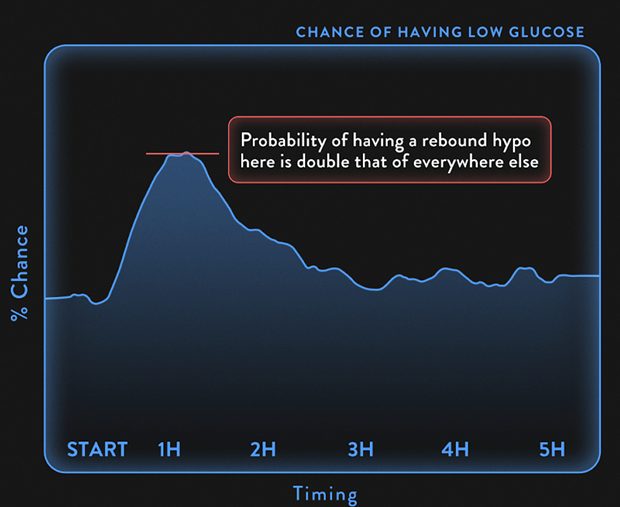New Study Reveals Link Between Pre-Exercise Food Timing and Reactive Hypoglycemia Risk
August 16, 2023

A groundbreaking study published in the European Journal of Sport Science sheds light on the association between the timing of pre-exercise food ingestion and the risk of reactive hypoglycemia.
[Atlanta]/ENDURANCE SPORTSWIRE/ – A groundbreaking study published in the European Journal of Sport Science sheds light on the association between the timing of pre-exercise food ingestion and the risk of reactive hypoglycemia. Conducted by a team of esteemed researchers, including David Lipman, Kristina Skroce, Andrea Zignoli, and Howard Zisser, the study utilized data from the Supersapiens database to analyze minute-by-minute continuous glucose monitoring (CGM) records.
Key Findings:
- The study examined a group of 6,761 users who logged a total of 48,799 pre-exercise food events with CGM data.
- On average, reactive hypoglycemia, defined as glucose levels dropping to <70 mg/dL in the first 30 minutes of exercise, was detected in approximately 8% of the total events.
- At least 15% of individuals experience reactive hypoglycemia in more than 20% of their pre-exercise food ingestion events.
- The majority of reactive hypoglycemia events occurred with pre-exercise food timing between approximately 30 and 90 minutes with a peak at around 60 minutes.
Significance of the Study:
The research highlights a critical link between the timing of pre-exercise food ingestion and the likelihood of reactive hypoglycemia. According to the data, there appears to be an unfavorable 30-to-90-minute window for consuming pre-exercise food, which significantly impacts the risk of experiencing reactive hypoglycemia in some individuals. For about 8 out of 100 individuals, the timing of pre-exercise food ingestion can have a meaningful impact on the occurrence of reactive hypoglycemia. This confirms what was previously known in the literature from lab tests, where different carbohydrate quantities and qualities were linked to pre-exercise food timing. This stands out as interesting to Supersapiens scientific team because the presence of an unfavorable window was believed to exist, and this research confirms its presence in a real-world setting.
This is the first study of its kind; using free-living conditions rather than a lab-based scenario. Similarly, it is the first study to indicate specific risk windows for reactive hypoglycemia. This type of work represents the evolution of the way science can be taken from the lab to the field (or vice versa) thanks to technology such as continuous glucose monitors.
Reactive Hypoglycemia and Its Implications:
Post-meal reactive hypoglycemia is a condition that occurs after a food-related hyperglycemia that leads to high insulin secretion resulting in a final consequence as a rapid drop in glucose levels. This can happen before or during physical activity. Individuals experiencing reactive hypoglycemia may encounter symptoms such as shakiness, dizziness, sweating, nausea, headache, blurred vision, and confusion. This condition can be challenging for athletes and individuals engaged in exercise, as it may hinder performance and overall well-being.
What’s Next:
The findings of this study hold significant implications for individuals managing their glucose, especially those prone to reactive hypoglycemia. Understanding the relationship between pre-exercise food timing and the risk of hypoglycemia can empower individuals to make informed choices about their nutrition and exercise routines. The likelihood of a reactive hypoglycemia event is driven mainly by carbohydrate consumption. In this study, Supersapiens did not have details about food type but may look to further investigate the role of carbohydrate specifically.
About Supersapiens
Supersapiens is aiming to be the most influential sports brand of the decade. They develop innovative insights around glucose that drive positive behavior change and unlock better performance and recovery.
Abbott’s Libre Sense Glucose Sport Biosensor is intended for athletes to measure their glucose levels. When used with a compatible product, the biosensor allows athletes to correlate their glucose levels and their athletic performance.
The Supersapiens system including Abbott’s Libre Sense Glucose Sport Biosensor is not intended for medical use and is not intended for use in screening, diagnosis, treatment, cure, mitigation, prevention, or monitoring of diseases, including diabetes.
The Supersapiens system including Abbott’s Libre Sense Glucose Sport Biosensor is not for sale in the U.S and is only available in select countries. For a full list of references and FAQs, please visit our Education Hub and Knowledge Base.
###
Note to Editors:
The full research article titled “Association between pre-exercise food ingestion timing and reactive hypoglycemia: insights from a large database of continuous glucose monitoring data” is available for reference in the European Journal of Sport Science.
For further information or media inquiries, please contact:
Fitzalan Crowe
703-596-2020



